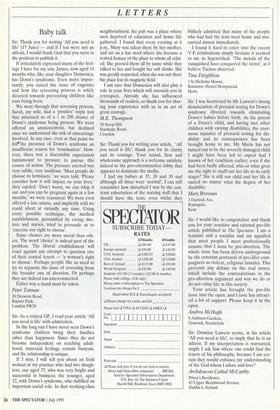Sir: As a retired GP, I read your article 'All
you need is life' with admiration.
In the long run I have never seen Down's syndrome children bring their families other than happiness. Since they do not become independent on reaching adult- hood, maternal feelings remain buoyant, and the relationship is unique.
If I may, I will tell you about an Irish woman in my practice who had two daugh- ters, one aged 37, who was very bright and successful in business; the younger, aged 32, with Down's syndrome, who fulfilled an important social role. In that working-class neighbourhood, the pub was a place where men deprived of education and home life gathered. I found that every evening at 6 p.m., Mary was taken there by her mother, and sat on a bar stool where she became a central feature of the place to whom all relat- ed. She greeted them all by name while they talked to her and bought her soft drinks. She was greatly respected; when she was not there the place lost its magnetic field.
I am sure that Domenica will also play a role in your lives which will astonish you in retrospect. Already she has influenced thousands of readers, so thank you for shar- ing your experience with us in an act of great courage.
M.K Thompson
28 Steep Hill, Stanhope Road, Croydon


































































 Previous page
Previous page